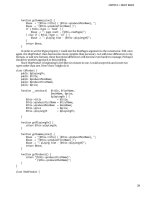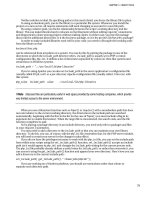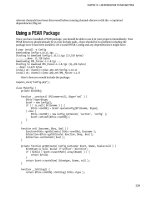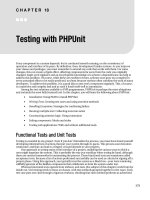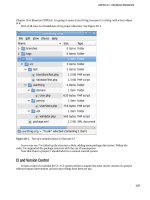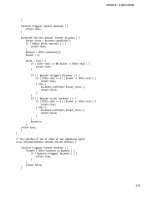Tài liệu PHP Objects, Patterns and Practice- P11 ppt
Bạn đang xem bản rút gọn của tài liệu. Xem và tải ngay bản đầy đủ của tài liệu tại đây (1.12 MB, 38 trang )
APPENDIX B ■ A SIMPLE PARSER
479
}
function trigger( Scanner $scanner ) {
return true;
}
protected function doScan( Scanner $scanner ) {
$start_state = $scanner->getState();
if ( empty( $this->parsers ) ) {
return true;
}
$parser = $this->parsers[0];
$count = 0;
while ( true ) {
if ( $this->max > 0 && $count >= $this->max ) {
return true;
}
if ( ! $parser->trigger( $scanner ) ) {
if ( $this->min == 0 || $count >= $this->min ) {
return true;
} else {
$scanner->setState( $start_state );
return false;
}
}
if ( ! $parser->scan( $scanner ) ) {
if ( $this->min == 0 || $count >= $this->min ) {
return true;
} else {
$scanner->setState( $start_state );
return false;
}
}
$count++;
}
return true;
}
}
// This matches if one or other of two subparsers match
class AlternationParse extends CollectionParse {
function trigger( Scanner $scanner ) {
foreach ( $this->parsers as $parser ) {
if ( $parser->trigger( $scanner ) ) {
return true;
}
}
return false;
}
Please purchase PDF Split-Merge on www.verypdf.com to remove this watermark.
APPENDIX B ■ A SIMPLE PARSER
480
protected function doScan( Scanner $scanner ) {
$type = $scanner->tokenType();
foreach ( $this->parsers as $parser ) {
$start_state = $scanner->getState();
if ( $type == $parser->trigger( $scanner ) &&
$parser->scan( $scanner ) ) {
return true;
}
}
$scanner->setState( $start_state );
return false;
}
}
// this terminal parser matches a string literal
class StringLiteralParse extends Parser {
function trigger( Scanner $scanner ) {
return ( $scanner->tokenType() == Scanner::APOS ||
$scanner->tokenType() == Scanner::QUOTE );
}
protected function push( Scanner $scanner ) {
return;
}
protected function doScan( Scanner $scanner ) {
$quotechar = $scanner->tokenType();
$ret = false;
$string = "";
while ( $token = $scanner->nextToken() ) {
if ( $token == $quotechar ) {
$ret = true;
break;
}
$string .= $scanner->token();
}
if ( $string && ! $this->discard ) {
$scanner->getContext()->pushResult( $string );
}
return $ret;
}
}
// this terminal parser matches a word token
class WordParse extends Parser {
function __construct( $word=null, $name=null, $options=null ) {
parent::__construct( $name, $options );
$this->word = $word;
}
Please purchase PDF Split-Merge on www.verypdf.com to remove this watermark.
APPENDIX B ■ A SIMPLE PARSER
481
function trigger( Scanner $scanner ) {
if ( $scanner->tokenType() != Scanner::WORD ) {
return false;
}
if ( is_null( $this->word ) ) {
return true;
}
return ( $this->word == $scanner->token() );
}
protected function doScan( Scanner $scanner ) {
$ret = ( $this->trigger( $scanner ) );
return $ret;
}
}
By combining terminal and nonterminal Parser objects, I can build a reasonably sophisticated
parser. You can see all the Parser classes I use for this example in Figure B–1.
Figure B–1.
The Parser classes
Please purchase PDF Split-Merge on www.verypdf.com to remove this watermark.
APPENDIX B ■ A SIMPLE PARSER
482
The idea behind this use of the Composite pattern is that a client can build up a grammar in code
that closely matches EBNF notation. Table B–1 shows the parallels between these classes and EBNF
fragments.
Table B–1.
Composite Parsers and EBNF
Class EBNF Example Description
AlternationParse orExpr | andExpr
Either one or another
SequenceParse 'and' operand
A list (all required in order)
RepetitionParse ( eqExpr )*
Zero or more required
Now to build some client code to implement the mini-language. As a reminder, here is the EBNF
fragment I presented in Chapter 11:
expr ::= operand (orExpr | andExpr )*
operand ::= ( '(' expr ')' | <stringLiteral> | variable ) ( eqExpr )*
orExpr ::= 'or' operand
andExpr ::= 'and' operand
eqExpr ::= 'equals' operand
variable ::= '$' <word>
This simple class builds up a grammar based on this fragment and runs it:
class MarkParse {
private $expression;
private $operand;
private $interpreter;
private $context;
function __construct( $statement ) {
$this->compile( $statement );
}
function evaluate( $input ) {
$icontext = new InterpreterContext();
$prefab = new VariableExpression('input', $input );
// add the input variable to Context
$prefaB–>interpret( $icontext );
$this->interpreter->interpret( $icontext );
$result = $icontext->lookup( $this->interpreter );
return $result;
}
function compile( $statement_str ) {
// build parse tree
$context = new \gi\parse\Context();
$scanner = new \gi\parse\Scanner(
new \gi\parse\StringReader($statement_str), $context );
$statement = $this->expression();
Please purchase PDF Split-Merge on www.verypdf.com to remove this watermark.
APPENDIX B ■ A SIMPLE PARSER
483
$scanresult = $statement->scan( $scanner );
if ( ! $scanresult || $scanner->tokenType() != \gi\parse\Scanner::EOF ) {
$msg = "";
$msg .= " line: {$scanner->line_no()} ";
$msg .= " char: {$scanner->char_no()}";
$msg .= " token: {$scanner->token()}\n";
throw new Exception( $msg );
}
$this->interpreter = $scanner->getContext()->popResult();
}
function expression() {
if ( ! isset( $this->expression ) ) {
$this->expression = new \gi\parse\SequenceParse();
$this->expression->add( $this->operand() );
$bools = new \gi\parse\RepetitionParse( );
$whichbool = new \gi\parse\AlternationParse();
$whichbool->add( $this->orExpr() );
$whichbool->add( $this->andExpr() );
$bools->add( $whichbool );
$this->expression->add( $bools );
}
return $this->expression;
}
function orExpr() {
$or = new \gi\parse\SequenceParse( );
$or->add( new \gi\parse\WordParse('or') )->discard();
$or->add( $this->operand() );
$or->setHandler( new BooleanOrHandler() );
return $or;
}
function andExpr() {
$and = new \gi\parse\SequenceParse();
$and->add( new \gi\parse\WordParse('and') )->discard();
$and->add( $this->operand() );
$and->setHandler( new BooleanAndHandler() );
return $and;
}
function operand() {
if ( ! isset( $this->operand ) ) {
$this->operand = new \gi\parse\SequenceParse( );
$comp = new \gi\parse\AlternationParse( );
$exp = new \gi\parse\SequenceParse( );
$exp->add( new \gi\parse\CharacterParse( '(' ))->discard();
$exp->add( $this->expression() );
$exp->add( new \gi\parse\CharacterParse( ')' ))->discard();
$comp->add( $exp );
$comp->add( new \gi\parse\StringLiteralParse() )
Please purchase PDF Split-Merge on www.verypdf.com to remove this watermark.
APPENDIX B ■ A SIMPLE PARSER
484
->setHandler( new StringLiteralHandler() );
$comp->add( $this->variable() );
$this->operand->add( $comp );
$this->operand->add( new \gi\parse\RepetitionParse( ) )
->add($this->eqExpr());
}
return $this->operand;
}
function eqExpr() {
$equals = new \gi\parse\SequenceParse();
$equals->add( new \gi\parse\WordParse('equals') )->discard();
$equals->add( $this->operand() );
$equals->setHandler( new EqualsHandler() );
return $equals;
}
function variable() {
$variable = new \gi\parse\SequenceParse();
$variable->add( new \gi\parse\CharacterParse( '$' ))->discard();
$variable->add( new \gi\parse\WordParse());
$variable->setHandler( new VariableHandler() );
return $variable;
}
}
This may seem like a complicated class, but all it is doing is building up the grammar I have already
defined. Most of the methods are analogous to production names (that is, the names that begin each
production line in EBNF, such as eqExpr and andExpr). If you look at the expression() method, you
should see that I am building up the same rule as I defined in EBNF earlier:
// expr ::= operand (orExpr | andExpr )*
function expression() {
if ( ! isset( $this->expression ) ) {
$this->expression = new \gi\parse\SequenceParse();
$this->expression->add( $this->operand() );
$bools = new \gi\parse\RepetitionParse( );
$whichbool = new \gi\parse\AlternationParse();
$whichbool->add( $this->orExpr() );
$whichbool->add( $this->andExpr() );
$bools->add( $whichbool );
$this->expression->add( $bools );
}
return $this->expression;
}
In both the code and the EBNF notation, I define a sequence that consists of a reference to an
operand, followed by zero or more instances of an alternation between orExpr and andExpr. Notice that I
am storing the Parser returned by this method in a property variable. This is to prevent infinite loops, as
methods invoked from expression() themselves reference expression().
The only methods that are doing more than just building the grammar are compile() and
evaluate(). compile() can be called directly or automatically via the constructor, which accepts a
statement string and uses it to create a Scanner object. It calls the expression() method, which returns a
tree of Parser objects that make up the grammar. It then calls Parser::scan(), passing it the Scanner
Please purchase PDF Split-Merge on www.verypdf.com to remove this watermark.
APPENDIX B ■ A SIMPLE PARSER
485
object. If the raw code does not parse, the compile() method throws an exception. Otherwise, it retrieves
the result of compilation as left on the Scanner object’s Context. As you will see shortly, this should be an
Expression object. This result is stored in a property called $interpreter.
The evaluate() method makes a value available to the Expression tree. It does this by predefining a
VariableExpression object named input and registering it with the Context object that is then passed to
the main Expression object. As with variables such as $_REQUEST in PHP, this $input variable is always
available to MarkLogic coders.
■
Note See Chapter 11 for more about the
VariableExpression
class that is part of the Interpreter pattern
example.
The evaluate() method calls the Expression::interpret() method to generate a final result.
Remember, you need to retrieve interpreter results from the Context object.
So far, you have seen how to parse text and how to build a grammar. You also saw in Chapter 11 how
to use the Interpreter pattern to combine Expression objects and process a query. You have not yet seen,
though, how to relate the two processes. How do you get from a parse tree to the interpreter? The answer
lies in the Handler objects that can be associated with Parser objects using Parser::setHandler(). Let’s
take a look at the way to manage variables. I associate a VariableHandler with the Parser in the
variable() method:
$variable->setHandler( new VariableHandler() );
Here is the Handler interface:
namespace gi\parse;
interface Handler {
function handleMatch( Parser $parser,
Scanner $scanner );
}
And here is VariableHandler:
class VariableHandler implements \gi\parse\Handler {
function handleMatch( \gi\parse\Parser $parser, \gi\parse\Scanner $scanner ) {
$varname = $scanner->getContext()->popResult();
$scanner->getContext()->pushResult( new VariableExpression( $varname ) );
}
}
If the Parser with which VariableHandler is associated matches on a scan operation, then
handleMatch() is called. By definition, the last item on the stack will be the name of the variable. I
remove this and replace it with a new VariableExpression object with the correct name. Similar
principles are used to create EqualsExpression objects, LiteralExpression objects, and so on.
Here are the remaining handlers:
class StringLiteralHandler implements \gi\parse\Handler {
function handleMatch( \gi\parse\Parser $parser, \gi\parse\Scanner $scanner ) {
$value = $scanner->getContext()->popResult();
$scanner->getContext()->pushResult( new LiteralExpression( $value ) );
}
Please purchase PDF Split-Merge on www.verypdf.com to remove this watermark.
APPENDIX B ■ A SIMPLE PARSER
486
}
class EqualsHandler implements \gi\parse\Handler {
function handleMatch( \gi\parse\Parser $parser, \gi\parse\Scanner $scanner ) {
$comp1 = $scanner->getContext()->popResult();
$comp2 = $scanner->getContext()->popResult();
$scanner->getContext()->pushResult(
new EqualsExpression( $comp1, $comp2 ) );
}
}
class BooleanOrHandler implements \gi\parse\Handler {
function handleMatch( \gi\parse\Parser $parser, \gi\parse\Scanner $scanner ) {
$comp1 = $scanner->getContext()->popResult();
$comp2 = $scanner->getContext()->popResult();
$scanner->getContext()->pushResult(
new BooleanOrExpression( $comp1, $comp2 ) );
}
}
class BooleanAndHandler implements \gi\parse\Handler {
function handleMatch( \gi\parse\Parser $parser, \gi\parse\Scanner $scanner ) {
$comp1 = $scanner->getContext()->popResult();
$comp2 = $scanner->getContext()->popResult();
$scanner->getContext()->pushResult(
new BooleanAndExpression( $comp1, $comp2 ) );
}
}
Bearing in mind that you also need the Interpreter example from Chapter 11 at hand, you can work
with the MarkParse class like this:
$input = 'five';
$statement = "( \$input equals 'five')";
$engine = new MarkParse( $statement );
$result = $engine->evaluate( $input );
print "input: $input evaluating: $statement\n";
if ( $result ) {
print "true!\n";
} else {
print "false!\n";
}
This should produce the following results:
input: five evaluating: ( $input equals 'five')
true!
Please purchase PDF Split-Merge on www.verypdf.com to remove this watermark.
Index
■ ■ ■
487
■ A
abstract classes, 45
approximation of, in PHP 4, 46
extending, 46
representing in UML, 111
reproducing the method signature, 46
Abstract Factory pattern, 124, 457
AppConfig class, code listing, 166
benefits of, 161
BloggsCal format, class diagram, 159
BloggsCommsManager class, code listing,
159
Civilization-style game, handling terrains,
163
clone keyword, using, 162, 165
CommsManager class, code listing, 159
getContact(), 160
implementing, 159
interface, class diagram, 158
make(), creating, 161
overview of, 157
abstract keyword, 45
abstract methods, 102
accept(), 211–212
acceptance tests, 379
AccessManager class, 217–218
acquire(), 333
add command, 371–372
add(), 282–283, 290, 478
addChargeableItem(), 48
addClassroot(), 250
addClean(), 293
addDirty(), 293
addEmployee(), 147
addNew(), 293, 295
addObserver(), 333
addParam(), 102
AddSpace command, 245, 247
addTest(), 304
addToMap(), 291, 300
addUnit(), 171, 173, 176, 213
addUser(), 381, 385
AddVenue command, 245, 247, 251, 255
addVenue(), 268
AddVenueController class
associated view, 260
code listing, 259
AddVenueTest class, code listing, 397
aggregation, 114
Alexander, Christopher, 124, 126
always element, 447
anonymous functions, 66, 68
Ant, 7, 407, 436, 440
api element, 336
AppConfig class, code listing, 166
AppController class, code listing, 251
Application Controller pattern, 222
addClassroot(), 250
AddSpace command, 245, 247
AddVenue command, 245, 247, 251, 255
advantages and disadvantages of, 256
AppController class, code listing, 251
application controller, definition of, 246
classroot element, 248
Please purchase PDF Split-Merge on www.verypdf.com to remove this watermark.
■ INDEX
488
Command class, code listing, 254
command element, 248
ControllerMap class, code listing, 249
doExecute(), 256
execute(), 255
FrontController class, code listing, 246
getCommand(), 253
getForward(), 253
getOptions(), 249
getResource(), 253
getStatus(), 255
getView(), 253
implementing, 246
overview of, 245
parsing the configuration file, 249
setting configuration directives, code
listing, 247
status element, 249
statuses(), 255
storing the configuration data, 249
using an application controller to acquire
commands and views, illustration of,
254
view element, 248
application scope, 229
ApplicationHelper class, 225, 238–239, 244
code listing, 237
ApplicationRegistry class, 234, 238–239, 245
code listing, 232
ApptEncoder class, 153
Archer class, 170
argData(), 93
Army class, 171
ArmyVisitor class, 213–214
array hinting, 27
array_slice(), 91
artifacts, definition of, 449
artifactspublisher element, 449
as element, 341
assertEquals(), 384
assertions
definition of, 383
PHPUnit’s support for, 384
AssertThat(), 387
AssertTrue(), 386
associations, unidirectional and bidirectional,
113
Atkinson, Leon, 5
attach(), 204–206, 209
attributes, 111
AuthenticateRequest class, 180
@author tag, 352
__autoload(), 80
automated build, 407, 459
■ B
Base class, 27, 33
code listing, 266
Beaver, Greg, 353
Beck, Kent, 5, 382
begintoken attribute, 420
behavior verification, 389
Bergmann, Sebastian, 382
Berkeley DB, 363
BinaryCloud, 5
BloggsCal format, 153
class diagram, 159
BloggsCommsManager class, code listing, 159
bombardStrength(), 170–171, 176
BooleanAndExpression class, 195
BooleanOrExpression class, 195
branches, 365
branching, 459
Bugzilla, downloading and using, 460
build reports, 436
build target, 447
build.xml, 407, 409, 440
buildStatement(), 309
buildWhere(), 310
business logic layer, 223
Domain Model pattern, 269
getting on with the business of an
application, 264
Transaction Script pattern, 265
See also presentation layer
■ C
__call(), 60, 86
call_user_func(), 67, 86
call_user_func_array(), 86–87
callbacks, 66
catch clause, 54, 56
cc.pid, 439
Please purchase PDF Split-Merge on www.verypdf.com to remove this watermark.
■ INDEX
489
channel element, 335, 339
channel-discover command, 328
channel-info command, 328
char_no(), 473
CharacterParse class, code listing, 477
Chargeable interface, 47
checkout command, 374
checkout target, 448
child class, 27
Civilization-style game
accept(), 211–212
addUnit(), 171, 173, 176, 213
Archer class, 170
Army class, 171
ArmyVisitor class, 213–214
AuthenticateRequest class, 180
bombardStrength(), 170–171, 176
code listing, 170
CompositeUnit class, 211
DecorateProcess class, 183
defensiveStrength(), 171
Diamond class, 182
Forest class, 180
getComposite(), 176–177
getDepth(), 211
getReport(), 215
getTax(), 215
getWealthFactor(), 179, 182
handling terrains with the Abstract Factory
method, 163
joinExisting(), 177
LaserCannonUnit class, 170
LogRequest class, 180
MainProcess class, 183
movementRange(), 171
Pollution class, 182
process(), 184
ProcessRequest class, 180, 183
Prototype pattern, code listing, 163
removeUnit(), 173, 176
setDepth(), 211
splitting composite classes off into a
CompositeUnit class, 175
storage in relational databases, 178
storage in XML, 178
StructureRequest class, 180
summary of, 178
TaxCollectionVisitor class, 215
Tile class, 179
$tile property, 182
TileDecorator class, 182
Unit class, 170, 210
$units property, 171, 173
visit(), 212
visitArmy(), 213
class diagrams, 110
classData(), 90
classes
abstract classes, 45–46
abstract super class, creating, 142
accessing a class residing in a global (non-
namespaced) space, 75
accessing methods and properties in the
context of a class, 41
accessing property variables, 18
accessor methods, 37
array hinting, 27
assigning values to properties, 18
__autoload(), 80
__call(), 86
call_user_func(), 86
call_user_func_array(), 86–87
class keyword, 15
class names, 15
class switching, 106
class type hints, 26
class_exists(), code example, 82
classes and objects, understanding, 15
client code, definition of, 18
__construct(), 21
constructor method, 21
constructors and inheritance, 33
declaring, 15
declaring a class or method final, 57
declaring class elements as public, private,
or protected, 35
defining the boundaries of classes, 105
definition of, 15
deriving classes from a base class, 27
describing a class’s responsibility, 105
designing child classes to provide
specialized functionality, 132
documenting with phpDocumentor, 352
extends keyword, 32
Please purchase PDF Split-Merge on www.verypdf.com to remove this watermark.
■ INDEX
490
function keyword, 19
get_class(), 83
get_class_methods(), 84
get_class_vars(), 85
get_declared_classes(), 82
get_parent_class(), 85
inheritance tree, building, 31
inheritance, definition of, 27
instanceof operator, 31, 83
invoking the parent class’s constructor, 32
is_callable(), 84
is_subclass_of(), 85
leaving an overzealous class unchanged,
109
locking down access control, 37
member variable, 17
method_exists(), 84
methods, definition of, 19
minimizing the use of concrete subclasses,
457
new operator, 16
null default values in hinted arguments, 27
organizing into package-like structures, 71
overridden method, invoking, 35
parent and child classes, 27
parent keyword, 33, 35
polymorphism, definition of, 106
prepending package names to class names,
72
private keyword, 17
properties, setting dynamically, 18
property, definition of, 17
protected keyword, 17
public keyword, 17
scope, definition of, 17
storing a method name in a string variable,
84
superclass, 27
testing that a method exists, 84
$this pseudo-variable, 20
tools for checking the type of an object, 83
using a string to invoke a method
dynamically, 86
using strings to refer to classes dynamically,
81
visibility keyword, 17, 19
See also objects
classroot element, 248
clean argument, 425
client code, definition of, 18
__clone()
copying by reference, 64
copying objects with, 63
implementing, 63, 165
making a new shallow copy, 64
clone keyword, 63, 162, 165
code coverage, generating, 431
code design, 99
code duplication, 109, 454
code smells, 109
CodeSniffer, 444
cohesion, definition of, 104
collection(), 294
CollectionParse class, code listing, 477
command and control layer, 223
Command class, 241, 247
code listing, 254
command element, 248
Command pattern
AccessManager class, 217–218
class diagram, 220
client, invoker, and receiver, 216
Command class, code listing, 217
execute(), 216
FeedbackCommand class, 219
implementing, 216
LoginCommand class, 217
overview of, 216
process(), 219
Registry class, 218
when application logic creeps into
command classes, 218
CommandContext class, code listing, 217
CommandFactory class, code listing, 218
CommandResolver class, 244
code listing, 240
CommsManager class, 153
code listing, 159
redesignating as an abstract class, 155
compile(), 484
components, building from scratch versus
purchasing, 317
composite (collection) parsers, 476
Composite pattern, 482
Please purchase PDF Split-Merge on www.verypdf.com to remove this watermark.
■ INDEX
491
add and remove functionality,
implementing, 173
benefits of, 174
Civilization-style game, code listing, 170
class diagram, 172
composite classes, 172
implementing, 172
inheritance tree, 170
leaf classes, 172, 174
modelling the relationship between
collections and components, 170
overview of, 169
splitting composite classes off into a
CompositeUnit class, 175
CompositeUnit class, 175, 211
composition, 115
combining objects to handle tasks
dynamically, 137
favoring composition over inheritance, 169
inheritance and, 132
conditional statements and polymorphism, 110
Conf class
code listing, 51
SimpleXml extension, 52
Conf(), 55
ConfException class, 55
Config class, 330
Config_Container class, 330
Config.php, 330
config.xml, 436, 440, 443
config-get command, 324
lack of Pyrus support for, 325
config-show command, 324
configuration flags, hard-coding, 166
connect(), 138
const keyword, 44
constant properties
defining within a class, 44
naming conventions, 44
constraints, 111, 386
constructors
__construct(), 21
inheritance and, 33
naming convention, 21
contents element, 336
Context class, code listing, 472
Continuous Integration (CI), 7, 322, 460
adding a version control system, 429
adding UserTests as a test suite class, 430
applying coding standards to a project, 433
automating the build and test process, 428
building and deploying a package using
package.xml, 435
CruiseControl, 436
defining coding guidelines and conventions
as a team, 433
failing to run tests, 428
Fedora 12, 432
generating a code coverage report, 431
installing a CI server, benefits of, 428
integration, definition of, 427
making systems easier to test and install,
428
PHP_CodeBrowser, installing and using,
433
PHP_CodeSniffer, 433
phpcb command line tool, 434
phpDocumentor, 431
phpUnderControl, 436
PHPUnit, 430
PHPUnit_Framework_TestSuite class, 431
practicing test-oriented development, 427
preparing a project for, 428
running unit tests, 430
Subversion, 430
ThoughtWorks, 436
transparency as a key principle, 431
userthing sample project, 429
writing documentation, 431
Xdebug, 432
Zend coding standard, 433
Controller class, 239
code listing, 236
ControllerMap class, code listing, 249
copy command, 373
copy element, table of attributes, 422
Copy task, 420, 422
@copyright tag, 352
coupling, 104
getNotifier(), 140
hiding the implementation details of a
notifier, 139
loosening, 139
MailNotifier class, 140
Please purchase PDF Split-Merge on www.verypdf.com to remove this watermark.
■ INDEX
492
Notifier class, 140
RegistrationMgr class, 140
TextNotifier class, 140
See also decoupling
create command, 363
create_function(), 67–68
createObject(), 278, 282, 287, 291, 298–300
CruiseControl
acquiring and building the userthing
project, 440
adding an install-package target, 447
adding your own build targets, 447
always element, 447
amending the CruiseControl environment
to support phpUnderControl, 439
Ant, 436, 440
artifacts, definition of, 449
artifactspublisher element, 449
bug in the phpuc graph command, 442
build target, 447
build.xml, 440
cc.pid, 439
checkout target, 448
CodeSniffer, 444
config.xml, 436, 440, 443
connecting to a mail server, 447
cruisecontrol.sh script, 439
customizing, 436
Dashboard screen, 437
depends attribute, 447
displaying the failed build, 448
downloading and installing, 437
email element, 446
ensuring automatic startup, 437
exec element, 443, 448, 450
failure element, 447
generating build reports, 436
htmlemail publisher, 447
installing Java as a requirement, 436
learning, 440
mailport element, 447
make-package target, 448
Metrics screen, 445
output attribute, 448
Overview screen, 443
pear package command, 448
phpuc project command, using, 441
phpunit task, code example, 443
publishers element, 446, 449
receiving failure notifications, 446
setting up a basic report for the install-
package target, 449
target elements, 443
testing the Validate class, 445
Tests tab, 446
ThoughtWorks, 436
usessl element, 447
validateUser(), 446
viewing an error report for a failed test, 446
wrong element, 448
XML Log File link, 449
CVS, 459
■ D
data layer, 223, 275
Data Mapper pattern
add(), 282–283
advantages and disadvantages of, 287
createObject(), 278, 282, 287
data mapper, definition of, 276
deconstructing into a set of finer-grained
patterns, 298
decoupling between the Domain layer and
database, 288
disconnect between classes and relational
databases, 276
doCreateObject(), 278–279, 286–287
doInsert(), 277–279
domain object assemblers, 311
DomainObject class, code listing, 284
DomainObjectAssembler class, code listing,
311
factoring the SpaceMapper class into
VenueMapper, 277
find(), 278–280
findAll(), 286
findByVenue(), 286
getCollection(), 284, 286
getFinder(), 284
getRow(), 282
getSpaces(), 285, 287
getVenueMapper(), 278
handling multiple rows, 280
implementing, 276
Please purchase PDF Split-Merge on www.verypdf.com to remove this watermark.
■ INDEX
493
insert(), 277–278
Iterator interface, code listing, 281
Iterator interface, table of methods, 280
managing mapper creation, 278
managing multiple rows with collections,
283
Mapper base class, code listing, 277
Mapper classes, illustration of, 276
Nock, Clifton, 311
notifyAccess(), 282
object-relational impedance mismatch, 276
persistence classes, illustration of, 312
print_r(), 279
Registry class, 278
selectAllStmt(), 286
selectStmt(), 279, 286
setSpaces(), 285, 287
targetClass(), 283
update(), 279
using HelperFactory to acquire both
collections and mappers, 284
Venue class, code listing, 284
VenueCollection class, 282
VenueCollection interface, code listing, 283
VenueMapper class, code listing, 278
Data Source Name (DSN), 138
data types
checking the type of a variable, 23
class type hints, 26
PHP as a loosely typed language, 22
primitive types and test functions, table of,
22
strategies for dealing with argument types,
25
type-related errors, preventing, 25
DBFace class, 404
DecorateProcess class, 183
Decorator pattern
class diagram, 182
inheritance tree, class diagram, 180
overview of, 179
summary of, 185
using composition and delegation, 181
decoupling
creating independent components, 137
definition of, 454
hiding implementation behind a clean
interface, 138
overview of, 137
reusability versus tight coupling, 137
See also coupling
DefaultCommand class, code listing, 243
defaultValue attribute, 424
defensiveStrength(), 171
DeferredEventCollection class, code listing, 297
delegating object instantiation, 147
delegation, definition of, 60
delete element, 425
dependencies tag, 339
depends attribute, 447
description element, 335
design patterns
Abstract Factory pattern, 124, 457
Alexander, Christopher, 124, 126
benefits of, 123, 127, 456
collaborative nature of, 128
defining a vocabulary, 127
defining common problems, 127
defining the conditions in which solutions
should be applied, 125
definition of, 6, 123, 455
developing a vocabulary for describing
problems and solutions, 456
early concept of, 4
favoring composition over inheritance, 169
Fowler, Martin, 124–125, 143, 456
Gamma, Erich, 125
Gang of Four’s categorization of, 143
Gang of Four’s format for structuring
patterns, 126
half-baked nature of, 456
Helm, Richard, 125
implementing nuanced solutions, 126
inscribing approaches to particular
problems, 124
Johnson, Ralph, 125
language independence of, 127
naming, 125
overuse of, 456
overview of, 125
pattern languages, 125
patterns suggest complementary patterns,
456
Please purchase PDF Split-Merge on www.verypdf.com to remove this watermark.
